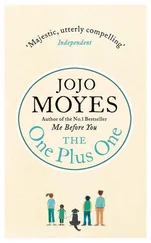She looked down at the pleats on her new suit, satisfied by how superior her outfit was compared with those of the girls around her. Her parents, who had been unable to see her off, had sent a telegram and some money, and her mother had arranged for the suit to be delivered that morning to the hotel. Avice had been worried about what to wear, unsure of the etiquette for such an occasion. Now, with a clear view of at least a hundred other girls, hardly any of whom seemed to have dressed for the occasion, she wondered why she had fretted.
The ship was shabby. Avice had had her picture taken, been interviewed by the Bulletin for its society pages, and someone whom she had been pretty sure was the captain had shaken her hand, but it didn’t alter the fact that the Victoria was rusting in places, and bore no more resemblance to the Queen Mary than Jean did to her namesake Jean Harlow. As Avice had made her way up the rickety gangplank, her nostrils had curled at the faint but definite aroma of boiled cabbage, which reinforced the second-class nature of her transport.
Still, no one could accuse Avice of lack of fibre. Oh, no. She straightened her shoulders and forced herself to think about what she was heading to. In six weeks, she would discover what her new life held. She would get to know his parents, take tea at the Rectory, meet the ladies of the quaint English village where they lived, perhaps the odd duke or duchess. She would be introduced to his friends, those outside the RAF, who had known him as a child. She would begin to make their home.
She would finally be Mrs Ian Radley, rather than just Avice – or, as her mother put it, ‘Oh, Avice . . .’ – who might be married but, as far as her family was concerned, seemed no more deserving of respect or adult consideration than she had been as a child.
‘Watch her!’
Avice glanced down to the deck below: Jean had just slipped off the side of the gun turret. She was hanging, giggling, from the trouser pocket of one of the ratings, her slip and a good deal of leg exposed to anyone who cared to look. She was about to say something, when she realised that the deck was vibrating gently under her feet: the engines must have started, not that they could be heard in the din. She looked over the edge and saw, with a start, that the gangplank had been hauled up. There was a swell of noise, and a short distance away a winch was hoisting up several sailors who had apparently missed their opportunity to get aboard by normal means. They were laughing and cheering, covered with lipstick kisses. Possibly even drunk.
Disgraceful, thought Avice, smiling despite herself as they were dumped unceremoniously on the flight deck above. Around them, small tugs bossed and bullied the vast ship, negotiating its slow release from the harbour. The women were chattering excitedly, waving with greater urgency, their voices lifting as each tried to make sure their message was heard over the hubbub.
‘Mum!’ a voice below Avice yelled, increasingly hysterically. ‘Mum! Mum!’
Someone beside her was praying, then broke off to exclaim to herself: ‘I can’t believe it! I can’t believe it!’
The crowd, a sea of Australian flags and the odd Union Jack, frothed and bubbled as people pushed towards the edge of the quay, bobbing above their neighbours to be seen by those aboard. Several placards were held aloft: ‘God Speed, Audrey’, ‘Good Luck from the Dockyard Workers of Garden Island’. She found herself gazing around the port, then at the hills beyond. Is this it? she thought suddenly, her breath catching in her throat. My last view of Australia? Then, with a lurch, the streamers snapped, their cobwebby strands releasing the ship from the rails of the dockside and, with an audible groan, she lurched away from the quay, sinking a few degrees as she slipped anchor.
There was a collective gasp. The engines began to power. A girl shrieked and over the din the band, now clearly visible on the quayside, struck up with ‘Waltzing Matilda’.
A few items were hurled from the ship’s berth and fell short, sending up small splashes of futility. The thin ribbon of blue water widened beneath them, then became an expanse. The ship, as if oblivious to the madness around it, glided, surprisingly quickly, away from the harbour.
‘You’ll be sorry!’ came a solitary cry, over the music. It sounded like a joke. ‘You’ll all be sorry!’
It was at this point that the ship’s passengers descended briefly into silence. Then, breaking it, the first of the girls began to cry.
Murray Donleavy placed his arm round his sobbing son, and sat silently as the crowds melted away, the sound of grieving women becoming more distinct. Finally, only a few huddles of people remained, staring out as the ship gradually merged with the horizon. It was getting chilly and the boy was shivering. He took off his jacket and threw it about Daniel’s shoulders, then hauled the boy against him for warmth.
Every now and then Daniel raised his head as if he wanted to speak, but was unable to find words and sank back into silent weeping, his face thrust into his hands as if the tears were a cause of shame.
‘Nothing to be sorry for, boy,’ he murmured. ‘It’s been a tough day.’
Theirs was one of the few vehicles remaining, sitting in a sea of muddied streamers and discarded sweet wrappers. Murray walked round to the driver’s side of the pickup, then halted when he noticed that his son was standing still and staring at him. ‘You all right now?’
‘Do you think she’ll hate me, Dad?’
Murray moved round and hugged his boy again. ‘Don’t be so bloody soft.’ He ruffled his hair. ‘She’ll be banging on about you visiting her before you know it.’
‘In England?’
‘Don’t see why not. You keep saving up that rabbit money and you’ll be able to fly there before you know it. Things are changing fast.’
The boy gazed ahead at nothing, transported to a world of richly rewarded pelts and huge aeroplanes. ‘I could fly there,’ he repeated.
‘Like I said, boy, you save your money. The rate you’re going, you’ll be able to pay for all of us.’
Daniel smiled then, and his father’s heart ached to see him meet another loss so bravely. This must be how it had felt for the women during the war, he observed, as he climbed into the truck. Except that they hadn’t known if we were coming back. Take care of her, he told the ship silently. Look after my girl.
They sat in the cab for a few moments, watching people trail out through the dockyard gates, seeing exposed the vast expanses of ground that had been invisible, hidden under human traffic. The wind was picking up now, sending bits of paper scuttling around the quayside, to be dived on by seagulls. He sighed, suddenly conscious of the length of the drive home.
‘Dad, she’s left her sandwiches.’ Beside him, Daniel held aloft the greaseproofed package that Letty had put together that morning. ‘It was here, on the floor. She’s left her lunch behind.’
Murray frowned, trying to remember what his daughter had said about leaving them at home. Oh, well, he thought. She must have been mistaken. That’s women when they’re carrying. All over the place. Noreen had been the same.
‘Can I have them, Dad? I’m starving.’
Murray stuck his key into the ignition. ‘Don’t see why not. They’re no use to her now. Tell you what, save one for me.’
It had finally begun to rain: the grey skies that had threatened to discharge their load all day were spitting against the windscreen. Murray started the truck, and reversed out slowly on to the dockside. Suddenly he hit the brake, sending Daniel shooting forward, his mouthful of sandwich spraying over the dashboard.
‘Hang on,’ he said, his face electrified with the memory of an empty basket and his daughter’s inexplicable hurry to get on board. ‘Where’s the bloody dog?’
Читать дальше












